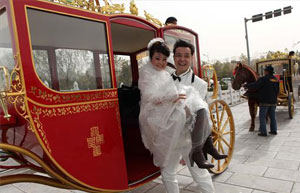Asian giants face the risks of urbanization
Updated: 2010-08-04 13
(Agencies)
Urbanization is the path to prosperity. But it can also be just a fancy word for penury.
Ask Mumbai's slum dwellers or the "ant tribes" of young office workers crammed into tiny rooms and shacks on the outskirts of Beijing.
The trajectory of growth across Asia, especially in populous India and China, will be shaped by the way governments tackle the complexities of urban development, from providing public works to endowing hundreds of millions of peasants who leave the land with the education and skills to thrive in the city.
Strategies will need to fit divergent demographic profiles. The working-age population of China will peak around 2015, putting a premium on sustaining growth in productivity to ease deteriorating dependency ratios.
India will be younger for longer. Its working-age population will swell by perhaps 270 million people by 2030. Job creation on a heroic scale, especially in mass manufacturing, will be imperative.
"The relative merits and opportunities of the demographic difference between the two countries are often overlooked," said Richard Dobbs, a director of McKinsey Global Institute, which has published in-depth studies on the issue.
M.G.I., the research arm of the management consulting firm McKinsey & Co., has offered a set of recommendations to transform urban India that it says could add 1 to 1.5 percentage points to annual growth in gross domestic product.
Releasing the potential of India's cities holds the key to capitalizing on its young population, M.G.I. says. It estimates that urban India will create 70 percent of all new jobs in the country in the next 20 years.
A study by Tushar Poddar, Goldman Sachs's economist in Mumbai, also digs into the powerful demographic forces at work.
Mr. Poddar says that urbanization could contribute 1.8 percentage points to annual G.D.P. in India by 2050 because labor is 3.5 times as productive in industry and 5 times as productive in services as in agriculture.
Paper's Digest

China bags Asiad team tennis title after 24 yrs
Wimbledon semifinalist Li Na led host China to capture the team tennis title on Tuesday at the Asian Games, accomplishing her Asiad tour with three consecutive victories.
China rate rises no panacea to curb inflation: PBOC adviser
Specials

Russian possessed with TCM
Born into a family of doctors, Maxime became interested in Traditional Chinese Medicine (TCM) at the age of 12, after hearing about TCM theories such as health preservation and recuperation.

Acupuncture takes stab at UNESCO list
Acupuncture and Peking Opera have been selected as candidates for UNESCO intangible cultural heritage status.

The wedding coach comes back to life
A groom carries his bride from a wedding coach in Xuchang, Henan province, Nov 11, 2010. Produced a local factory, various original hand-made wedding carriages were displayed on the streets, attracting young people chasing fashion and an environment-friendly lifestyle.
